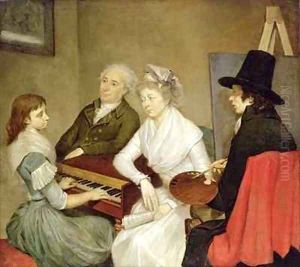Georg Ludwig Eckhardt Paintings
Georg Ludwig Eckhardt was a German composer and organist renowned for his contributions to the Baroque musical tradition. Born on March 30, 1694, in the town of Darmstadt, in the Landgraviate of Hesse-Darmstadt, part of the Holy Roman Empire, Eckhardt was raised in an era when music was undergoing significant development and transformation across Europe. His exact musical training is not thoroughly documented, but like many musicians of that period, he likely received his early education from family members or local church musicians.
Eckhardt's career is marked by his service to the nobility as a court musician. In 1719, he became the court organist in Darmstadt, a position he held until his death. Such roles typically involved not only playing the organ but also composing music for various occasions, teaching, and sometimes even participating in the maintenance of musical instruments. His work was highly esteemed by his contemporaries, and he was known for his skillful improvisations and his ability to play complex polyphonic works.
Throughout his life, Eckhardt composed a variety of musical pieces, including cantatas, keyboard works, and chamber music. However, much of his work has been lost over time, and only a fraction of his compositions have survived. Those that remain, though, exhibit the intricate counterpoint and expressive melodies characteristic of the late Baroque period.
Georg Ludwig Eckhardt died on November 11, 1759, in Darmstadt. His legacy is preserved in the music that survives him and in the historical records that acknowledge his service to the court and his reputation as a gifted organist and composer. While not as widely recognized as some of his contemporaries like J.S. Bach or Handel, Eckhardt's contributions to the musical world of his time are nonetheless appreciated by those who study and perform Baroque music today.



